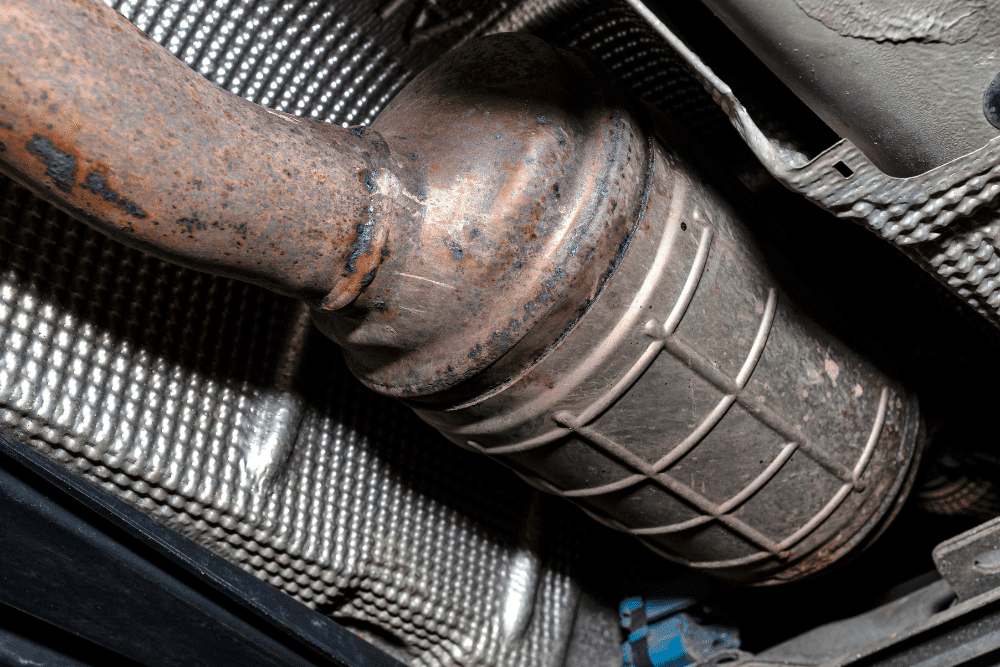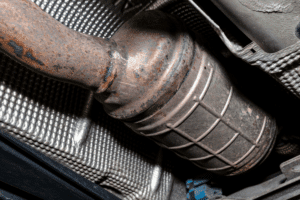Something as simple as a boost leak can end up costing you thousands more than it should. Why? Because when your diesel engine runs inefficiently and produces excess soot, your DPF and aftertreatment system becomes overwhelmed by contamination levels it was never designed to handle, leading to premature failure and costly replacement. Branch Automotive in Littleton, CO, specializes in catching these failures early, before a maintenance item becomes a major repair.
In this guide, we’ll reveal the real root causes of DPF failure, decode the warning signs your truck is giving you, and show you why immediate evaluation is your best defense against catastrophic damage.
The Truth About Aftertreatment System Failures
Here’s what most diesel truck owners don’t know: 95% of the time, an aftertreatment failure is the result of a failure in the engine or systems that create the soot that the aftertreatment systems are cleaning up. Diesel engines make soot, that black smoke that everyone hates so much. The DPF specifically traps and neutralizes the soot by performing a regeneration and burning the soot into ash, then the ash can pass through the DPF and exit the vehicle.
Why Proper Maintenance Is Critical
If there is too much soot to overcome because of inefficiency in the engine, you can absolutely damage a DPF. This is why proper maintenance and keeping vehicles running well is paramount. A boost leak (leaking charge air pipe or leaking intake manifold, or leaking exhaust connections, plus 100 other things) can end up costing loads more money and time than it should have because the DPF and aftertreatment system gets beat up because it has to deal with a lot more soot than it was designed for. It cannot do that for too long before it needs replacement.
Think of Your Aftertreatment System Like a Vacuum Cleaner
The biggest bit of information you need to know about DPFs and aftertreatment is this: get it evaluated immediately. These systems function a lot like a vacuum cleaner. When they become too full or plugged up, parts start needing to be replaced. If the team at Branch Automotive can catch the failure early enough, then we have a much better chance of saving the components, ultimately saving our clients money.
The Reality of Aftertreatment Replacements
Aftertreatment systems are expensive, and replacements can run several thousand dollars. The good news? Many issues can be repaired if caught early enough. However, systems that are severely contaminated or have failed internal components may be beyond saving. That’s why early diagnosis is so important. The sooner we can evaluate what’s happening, the better chance we have of keeping repair costs manageable.
The Old Car Mentality Will Cost You
Lots of people treat this like an old car: lights on, but it still runs so I’m good. This isn’t the case. The light is on to say “look, I know you don’t want to go in now, but you’ll really not want to go in later.” Waiting means spending more time and money every time.
Modern diesel trucks are constantly monitoring their own performance and emissions to ensure they’re running to specification and not polluting. They have sophisticated sensors and emissions controls that require attention when warning lights appear. Ignoring them makes the problem exponentially worse.
How Your DPF Works
Your diesel particulate filter, also called a soot trap, captures exhaust soot and other contaminants before they exit your vehicle. Unlike an oil filter that you simply replace, your DPF has a self-cleaning process called regeneration where filtered soot particles burn off at high temperatures around 600 degrees Celsius.
Three Types of Regeneration:
- Passive Regeneration: Occurs naturally during extended highway drives at higher speeds
- Active Regeneration: Your truck’s computer initiates it by injecting extra fuel to raise exhaust temperatures
- Forced Regeneration: A service procedure performed by qualified diesel mechanics using manufacturer scan tools
The challenge for many drivers in Littleton, Highlands Ranch, and surrounding areas is that short trips and stop-and-go traffic don’t allow your truck to reach the temperatures needed for proper regeneration.
Warning Signs Your DPF Needs Immediate Attention
Your truck will tell you when something’s wrong. Don’t ignore these symptoms:
- DPF Warning Light: The most obvious indicator that needs immediate evaluation
- Limp Mode Activation: Your truck limits power to prevent further damage
- Reduced Fuel Economy: You’re filling up more often than usual
- Loss of Power: Noticeable decrease in acceleration and towing capacity
- Hard Starting: Extended cranking time or difficulty getting your truck started
- Unusual Exhaust Smell: Strong odors during operation
Need help diagnosing your diesel truck’s warning lights? Contact Branch Automotive at (303) 771-2224 or visit us at 6030 E County Line Road, Littleton, CO 80126 to schedule an evaluation.
What's Really Causing Your DPF Problems
The DPF itself rarely fails on its own. The real culprits are usually hiding elsewhere in your engine systems. When your engine runs inefficiently, it produces more soot than your aftertreatment system was designed to handle.
Common Root Causes of Excess Soot Production:
- Boost Leaks: Leaking charge air pipes, intake manifolds, or exhaust connections
- Fuel System Issues: Worn injectors affecting combustion
- Turbocharger Problems: Reduced boost pressure
- EGR System Failures: Excessive exhaust gas recirculation
- Oil Consumption: Engine wear causing oil to enter the combustion chamber
- Neglected Maintenance: Skipped oil changes or dirty air filters
The Domino Effect
Ignoring small problems can lead to significant DPF damage. Neglecting maintenance is not a winning game in diesel trucks. Staying ahead of issues helps you avoid turning routine maintenance into costly, time-consuming repairs.
Why Branch Automotive Is Your True Diesel Specialist
When you bring your diesel truck to Branch Automotive in Littleton, CO, you’re working with true diesel specialists. We’re one of the few diesel emission testing facilities certified by the state of Colorado, and we handle diesel repairs day in and day out.
What Sets Us Apart
- Four ASE Master Technicians on staff
- GM World Class Master and ASE World Class Technician certifications (one of only 1,100 nationwide)
- Multiple technicians with Ford and GM factory training in diesel repair
- Manufacturer scan tools and software for Dodge/RAM, GM, and Ford trucks
- Chassis Dynamometer that simulates real-world driving conditions
- Nationwide warranty on most repairs
- Convenient text messaging to keep you informed
Our Commitment to Saving Your Components
We’d love to save them all. We don’t want to sell you a new aftertreatment system. We want to clean and repair your current one. When cleaning is possible, we use advanced cleaning technology and specialized chemicals that eliminate excess soot without harming your vehicle’s components.
Our philosophy focuses on better value through better communication, better practices, better people, better availability, and better turnaround times by being specialized. We do the repair as it should be done, not cutting corners, and we take pride in our work all through the shop.
Preventing Future DPF Failures
The best defense against expensive aftertreatment system repairs is proper preventative maintenance. At Branch Automotive, we believe in doing the repair as it should be done, not cutting corners, and taking pride in our work.
Our Maintenance Recommendations:
- Don’t Ignore Warning Lights: Get your truck evaluated immediately when dashboard indicators appear
- Maintain Oil Change Intervals: We recommend changing engine oil every 5,000 miles to protect the engine and components
- Keep Original Equipment Parts: Don’t modify with cold air intakes, tuners, or other aftermarket parts that affect emissions
- Address Performance Issues Promptly: Poor running conditions lead to excess soot production
- Stay Up on Maintenance: Don’t let things get to a state of needing a repair when proper maintenance will save money, time, and frustration
Modern diesel trucks have preventative maintenance items for lots of systems that will help maximize performance and reliability.
FAQs About Diesel DPF Failure and Aftertreatment Systems
Why is my DPF warning light on?
Your DPF warning light indicates excessive soot buildup in your diesel particulate filter. This occurs when the filter cannot complete its natural regeneration process, often due to short trips that don’t allow exhaust temperatures to reach the levels needed to burn off accumulated soot.
What is a DPF regeneration?
DPF regeneration is the self-cleaning process where accumulated soot burns off at high temperatures around 600 degrees Celsius. This happens naturally during highway driving or through computer-controlled fuel injection. Forced regeneration by a mechanic may be necessary if the filter becomes too clogged.
What causes DPF failure on a diesel truck?
DPF failure is usually caused by engine problems that create excess soot, not by the DPF itself. Boost leaks, worn fuel injectors, turbocharger issues, and poor maintenance cause your engine to produce more soot than the aftertreatment system was designed to handle, overwhelming the DPF and leading to premature failure.
How do I know if my DPF is clogged?
Common signs include an illuminated warning light, reduced power and fuel economy, limp mode activation, poor throttle response, difficulty starting, and unusual exhaust odors. If you experience any of these symptoms, have your truck evaluated immediately to prevent further damage.
Can a clogged DPF be cleaned or does it need replacement?
Many clogged DPF filters can be professionally cleaned if addressed early enough. At Branch Automotive, we use advanced aqueous cleaning technology to remove excess soot and restore filter function. However, filters that are too damaged, poisoned, or severely clogged may require replacement. Early evaluation gives your DPF the best chance of being saved.
Schedule Your Diesel DPF Evaluation in Littleton, CO Today
Don’t wait until a clogged DPF filter becomes a catastrophic failure. If your DPF warning light is on, get your truck evaluated immediately. Our true diesel specialists at Branch Automotive have the state-of-the-art equipment to diagnose and repair your aftertreatment system properly.
We serve drivers throughout Littleton, Highlands Ranch, Centennial, Cherry Hills, Lone Tree, Parker, Castle Rock, Greenwood Village, and Lakewood across Douglas, Elbert, and Arapahoe Counties. Visit Branch Automotive at 6030 E County Line Road, Littleton, CO 80126, or call (303) 771-2224 to schedule your diesel truck inspection.



